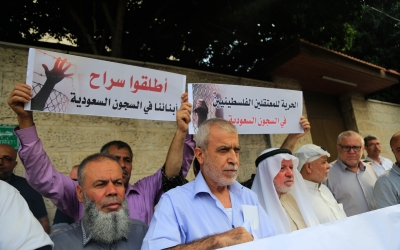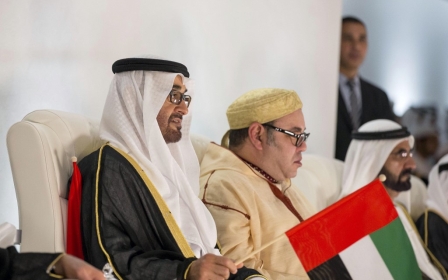Arabic press review: Hamas demands release of Palestinians from Saudi prisons

Hamas calls on Saudis to free Palestinians
The head of the Hamas movement politburo, Ismail Haniyeh, has called on the Saudi king to release Palestinian detainees in Saudi prisons, in order to protect them from the spread of the coronavirus, according to Arabi21.
New MEE newsletter: Jerusalem Dispatch
Sign up to get the latest insights and analysis on Israel-Palestine, alongside Turkey Unpacked and other MEE newsletters
"Amid the coronavirus pandemic that is sweeping the world, out of fear for the lives of the honourable brothers, and following all the human and religious issues of the Kingdom of Saudi Arabia in dealing with the cause of Palestine and its people who have lived for years on the Kingdom’s land… the release of Palestinians becomes a humanitarian and national necessity, and we are all sure that His Majesty will not hesitate to do it," Haniyeh said in a letter to King Salman bin Abdulaziz.
At least 68 Palestinians are being held in four prisons across Saudi Arabia on charges of having ties with Palestinian resistance group Hamas.
Until recently, Hamas had diplomatic representation in the kingdom, but Saudi-Palestinian relations have become tense in the past few years as Crown Prince Mohammed bin Salman is believed to be seeking a normalisation of relations with Israel.
Kuwaiti jailed for coronavirus tweet
Kuwait has sentenced a citizen to 12 days in jail because he posted about coronavirus on Twitter, according to Kuwaiti local newspaper Al-Qabas.
The paper cited an “informed source” as saying that the arrest of the Kuwaiti national was due to a tweet he posted saying that dozens of Egyptians infected with coronavirus - who had recently arrived in the country after being exempted from undergoing medical examination in Egypt - were currently hospitalised.
Kuwaiti police have denied the allegation, according to Al-Qabas.
In the past few weeks, the Kuwaiti prosecution has imprisoned three Egyptian residents on charges of spreading false news about coronavirus.
In early March, the Kuwaiti interior ministry stopped issuing all visas to Egyptians "until further notice" as part of its precautionary plans to confront the virus.
Coronavirus 'spreading among Syrian detainees'
Security leaks from Damascus showed statistics and photos claiming the death of hundreds of detainees inside government prisons in the Syrian capital, according to Soshal website.
According to the leak, the total number of deaths and people infected with coronavirus in Adra prison has reached 1,083, while dozens of detainees were in critical condition.
Registered infections among detainees stands at 816, while 204 people have died.
Sixty-three people are in critical condition, according to the same leak.
Leaked letter from Egypt prison on virus fears
An Egyptian human rights activist has published and shared with Arabic media what he said was a leaked letter from one of Egypt’s most notorious prisons conveying prisoners’ fears of a potential Covid-19 outbreak.
The letter, according to Ahmed Attar, was leaked by detainees in Tora, where many political prisoners are held.
The prisoners demanded intervention to “save them before an imminent spread of the coronavirus”, warning of a humanitarian disaster.
The prisoners have been banned from receiving visitors for over two weeks as a precautionary measure against the virus, but they warned they were running out of the food and medical and hygiene supplies which their families used to send them.
The letter highlighted the absence of minimum health and safety standards, such as access to sunlight and clean water.
* Arabic press review is a digest of reports that are not independently verified as accurate by Middle East Eye.
Middle East Eye delivers independent and unrivalled coverage and analysis of the Middle East, North Africa and beyond. To learn more about republishing this content and the associated fees, please fill out this form. More about MEE can be found here.





